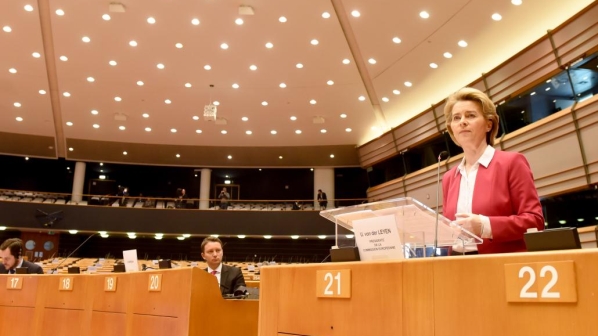The plan outlines a “powerful, modern and revamped” long-term EU budget boosted by Next Generation EU, an emergency temporary recovery instrument, to help repair the immediate economic and social damage brought by the coronavirus pandemic, kickstart the recovery and prepare for a better future.
The proposal needs the approval of all 27 member states before being adopted.
The EC sees an opportunity to use the pandemic as a springboard to develop an economy that is both more digitally focused and economically friendly - both themes that could benefit the rail industry.
“To protect lives and livelihoods, repair the single market, as well as to build a lasting and prosperous recovery, the EC is proposing to harness the full potential of the EU budget,” the EC says in a statement.
The €750bn Next Generation EU instrument, along with targeted reinforcements to the long-term EU budget for 2021-2027 will bring the total financial firepower of the EU budget to €1.85 trillion.
“The recovery plan turns the immense challenge we face into an opportunity, not only by supporting the recovery but also by investing in our future: the European Green Deal and digitalisation will boost jobs and growth, the resilience of our societies and the health of our environment,” says EC president, Ms Ursula von der Leyen. “This is Europe's moment. Our willingness to act must live up to the challenges we are all facing. With Next Generation EU we are providing an ambitious answer.”
The funding from Next Generation EU will be channelled through EU programmes in the revamped long-term EU budget, including the European Green Deal. This will provide a “boost for rail travel and clean mobility in our cities and regions,” the EC says, along with other initiatives to allow cleaner transport and logistics such as the installation of one million charging points for electric road vehicles.
As part of the transition towards a “green and digital Europe,” the EC has identified clean transport as one sector requiring large scale investment, along with renewable energies and clean hydrogen solutions, sustainable food and a smart circular economy. According to the European Environment Agency, rail accounted for 0.5% of transport emissions in 2017, compared with 71.7% for road, 13.9% for air, and 13.3% for maritime.
Rail will directly benefit from an additional €1.5bn for the Connecting Europe Facility, which will assist in creating high-performance transport infrastructure to facilitate cross-border connections such as the Rail Baltica high-speed rail project linking Estonia, Latvia, Lithuania and Poland.
The rail industry could also benefit from the rapid deployment of 5G networks, which are also prioritised under the deal, along with a stronger industrial and technological presence in strategic sectors including artificial intelligence, cybersecurity, supercomputing and the cloud.
To improve the recovery of companies across the continent, the EC has created the short-term European Unemployment Reinsurance Scheme (Sure), which will provide €100bn to support workers and businesses.

